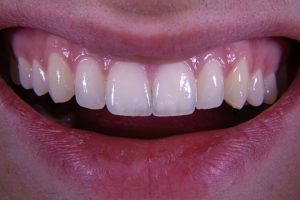Dental crowns are tooth-shaped caps that cover all surfaces of the tooth while restoring the strength and functionality of teeth with inadequate structural integrity. While dental crowns may be made of a variety of materials like gold, stainless steel, etc., the aesthetic dental crowns that blend into the remaining teeth are made from tooth-colored ceramics like porcelain. Porcelain dental crowns are the most popularly used aesthetic dental crowns and impart a natural appearance to the tooth.
Table of Contents
Uses of a Dental Crown
- Strengthen and protect structurally weak tooth, especially after root canal treatment
- Hold together a cracked tooth in place
- Restore functions of a compromised tooth
- Give support to a fixed dental bridge
- Cover stained or misshapen tooth
- Dental crown over a dental implant
Types of Porcelain Dental Crowns
Porcelain dental crowns are broadly of two kinds; porcelain-fused-to-metal crowns (PFM crowns) and all-porcelain crowns. PFM crowns are essentially metal crowns with a layer of tooth-colored porcelain over it to make it aesthetically acceptable. They have considerably more strength than all-porcelain dental crowns. They are usually given in the posterior regions of the mouth, which needs to withstand higher forces.
All-porcelain dental crowns are made entirely from translucent porcelain and have a higher aesthetic value than PFM crowns. They are most commonly used to cover defects in the front teeth. This is because, with PFM crowns, a thin margin of metal is always visible, which makes them an unsuitable choice for covering front teeth. While all-porcelain dental crowns have the advantage of a natural tooth-like appearance, they lack the strength of PFM crowns.
All-porcelain dental crowns also come in several types such as –
- Feldspathic porcelain, which is the oldest type of porcelain used in dentistry.
- Procera porcelain crowns, which have milled ceramic on the inside and traditional porcelain on the outside. This type is known for its exceptional strength.
- Zirconia crowns and EMax crowns are other popular varieties known for their aesthetic value.
Advantages of Porcelain Dental Crown
Apart from the most significant advantage of being aesthetically pleasing, porcelain dental crowns are also beneficial to individuals who have metal allergies. Porcelain is highly biocompatible, with the possibility of corrections in alignment and form even after fabrication.
Disadvantages of Porcelain Dental Crown
While porcelain crowns are popular and frequently used, they do have some disadvantages. For starters, all-porcelain crowns can be expensive, especially if the crowns need to be placed on multiple teeth. Moreover, their preparation time can be quite long and complicated.
How Long Does a Porcelain Dental Crown Last?
Porcelain dental crowns have long had a reputation for being fragile and prone to breakage. On an average, porcelain dental crowns can last 5-15 years. The durability of the crown depends on the individual’s oral hygiene measures, their lifestyle, and their eating habits. Porcelain dental crowns do undergo wear and tear. Still, specific actions like lack of good oral hygiene, bad eating habits, etc. can accelerate the damage caused to porcelain crowns. With the right care and maintenance, porcelain dental crowns can even last for up to 25 to 30 years. Some tips to increase the longevity of your porcelain crowns are:
- Avoid chewing on hard foods like hard candy, nuts, and ice. Using your teeth as a tool to open bottles and jars should also be avoided.
- Maintenance of good oral hygiene is essential. While porcelain crowns cannot undergo decay, the underlying tooth can, as long as the tooth remains healthy, the life of the crown will also be prolonged.
- People who have teeth-grinding or clenching habits should preferably wear night-guards while sleeping. Excessive pressure on porcelain crowns can cause it to crack.
Lastly, it is advised to go for regular check-ups to the dentist, which would allow for routine examinations of your natural teeth as well as your restorations.







